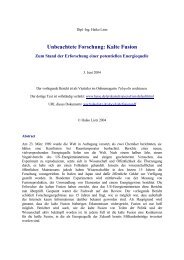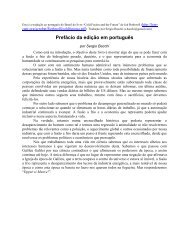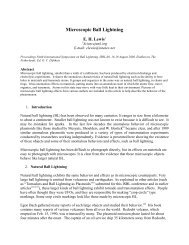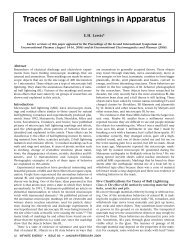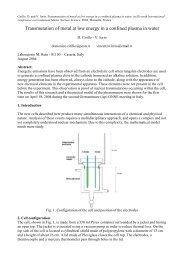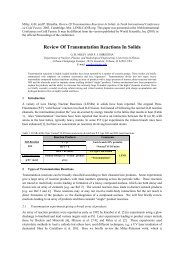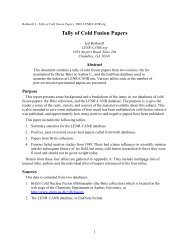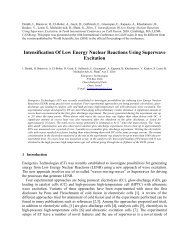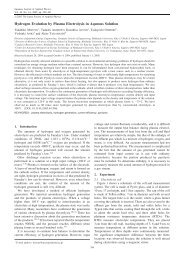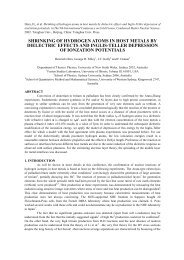Volume 2 - LENR-CANR
Volume 2 - LENR-CANR
Volume 2 - LENR-CANR
You also want an ePaper? Increase the reach of your titles
YUMPU automatically turns print PDFs into web optimized ePapers that Google loves.
Introduction to Challenges and Summary<br />
The field of <strong>LENR</strong> has all the challenges of any accepted part of science, plus the burden of<br />
gaining acceptance and recognition as a legitimate field of scientific inquiry. The normal<br />
challenges include the design and performance of sound experiments, and the development and<br />
application of theories to explain past observations or make predictions. They also include<br />
communications of results through discussions, presentations and journal articles. Now, all of<br />
these things do apply to <strong>LENR</strong>, although it is difficult or impossible to get many of the<br />
appropriate journals to even consider papers from scientists in the field.<br />
The problem of <strong>LENR</strong> becoming a recognized field of scientific research is very challenging.<br />
Acceptance as a part of science would have far reaching consequences. Now, in the US,<br />
responsible people in both the Congress and the Administration correctly assert that they are<br />
not scientists. They are waiting for the scientific community to examine <strong>LENR</strong> and pronounce<br />
judgment, not on its details, but only whether or not it should be considered as a science.<br />
Administrators in the US Patent and Trademark Office, who are not scientists, have the same<br />
refrain. They await scientists with relevant competencies to examine information on <strong>LENR</strong> and<br />
render an opinion on its being, or not being, part of science. Those responsible for<br />
documentation and communication of scientific results, the editors of scientific journals and<br />
magazines, also correctly assert note that they are not scientists (even though many of them<br />
were scientists earlier in their careers). They want others, who are now practicing (publishing)<br />
scientists, to examine results on <strong>LENR</strong> and say what they think about the field as a science.<br />
So, why is are key scientists individually and the scientific community, broadly considered,<br />
unwilling to (a) examine the evidence, (b) draw conclusions about the nature of work on <strong>LENR</strong><br />
and (c) communicate them to other scientists and the public? Part of the reason is that most<br />
scientists are busy with their own research, and not willing to spend time on examining <strong>LENR</strong><br />
information. There is, after all, little likelihood of either support or fame in such an activity.<br />
Some scientists are fear-filled as a result of the residual poor reputation of the field. They are<br />
afraid that their reputations would be tainted and, maybe, their careers destroyed. Then, there<br />
are a few very prominent and vocal ex-scientists who speak out against the field even though<br />
they seem not to be aware of key results from <strong>LENR</strong> research. They may have had strong<br />
scientific careers at one time, but they no longer contribute to the advancement of knowledge<br />
by actually doing research and publishing the results. Whatever motivates these people, money<br />
or ego or anything else, they do themselves and the field a real disservice. This is especially<br />
true in the case of <strong>LENR</strong>.<br />
It is uncertain if and when the current research phase of <strong>LENR</strong> will be the basis for practical<br />
energy sources. However, the prospects of small distributed nuclear power sources, without<br />
dangerous prompt radiation nor significant radioactive waste, deserves consideration. Those<br />
possibilities are in addition to the wonderful scientific challenge of understanding how it is<br />
possible to stimulate MeV nuclear reactions by using eV chemical energies.<br />
Whether or not <strong>LENR</strong> energy sources prove to be important, there are some basic<br />
requirements for the operation of <strong>LENR</strong> experiments. One of the most fundamental is<br />
replication. Hence, this conference included an invited paper by McKubre on replication. He<br />
670



